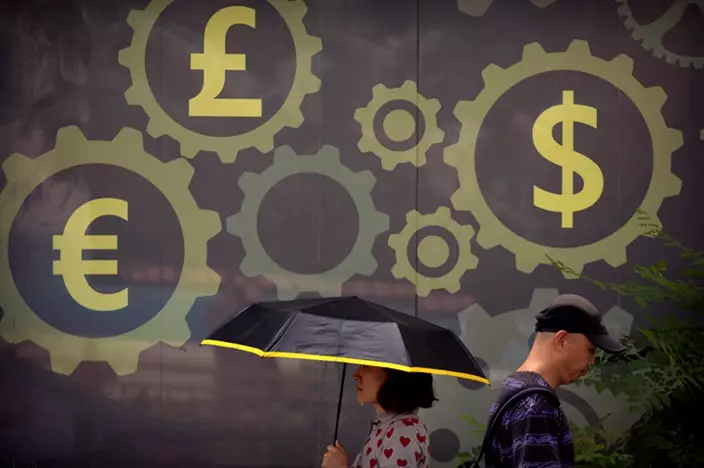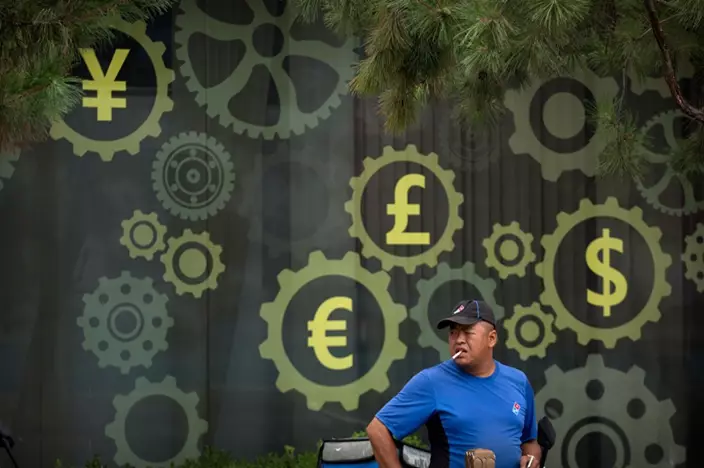China's central bank is allowing its tightly controlled currency to drift lower against the dollar, a move that could help Chinese exporters cope with U.S. tariff hikes but also might reignite an outflow of capital Beijing spent months trying to stanch.
On Friday, the yuan dipped to a 12-month low of 6.8 to the dollar, off by 7.6 percent since mid-February.

People walk past a mural displaying world currency symbols on the outside of a bank in Beijing, Friday, July 20, 2018. (AP Photo/Mark Schiefelbein)
The slide comes amid a deepening U.S.-Chinese tariff fight that prompted suggestions Beijing might weaken the yuan to help exporters. But financial analysts say while trade tensions rattle investors, the decline has been driven mostly by China's slowing economic growth and the diverging direction of U.S. and Chinese interest rate policy.
Still, a weaker yuan could help Chinese exporters by holding down their prices in dollar terms after Washington's July 6 imposition of 25 percent tariffs on $34 billion of goods from China in a dispute over technology policy.

A deliveryman for American-based pizza chain Domino's prepares to make a delivery near a mural displaying world currency symbols on the outside of a bank in Beijing, Friday, July 20, 2018. (AP Photo/Mark Schiefelbein)
The decline "does provide a significant offset to the loss in export competitiveness for Chinese exporters," Rajiv Biswas of IHS Markit said in a report Friday.
A continued slide would be a growing concern for competing Asian exporters such as Vietnam, Biswas said. Their goods will become more expensive relative to China's.
The trade dispute has complicated efforts by the People's Bank of China to make the exchange rate system more flexible, market-oriented and efficient.
Over the past three years, Beijing has gradually widened the narrow band in which the yuan is allowed to fluctuate, though regulators intervene regularly to guide its movement. They also have increased the margin by which the state-set daily starting price for trading can be changed.
That allows the central bank to intervene less often, but the currency can fall faster than regulators might want.
The central bank "defended the currency in early July but now it seems gravity is doing its job again as monetary policy diverges further between the U.S. and China," Margaret Yang of CMC Markets said in a report.
The U.S. Federal Reserve is raising interest rates while Beijing eases access to credit to support cooling economic growth. That encourages investors to move money out of China in search of higher U.S. returns.
The dollar edged lower against the yen and the euro after Trump expressed unhappiness Thursday with the Fed's rate hikes.
On Friday, the dollar fell further, weakening to 112.35 yen from Thursday's 112.46. The euro rose for a second day, gaining to $1.1655 from $1.644.
Economists say that while Beijing suppressed the yuan's exchange rate a decade ago to help exporters, the central bank has intervened over the past three years to keep it in line with a rising dollar. That required it to spend up to tens of billions of dollars a month from Chinese foreign currency reserves.
The yuan's decline looks less dramatic compared with other currencies. It is off just 1.3 percent since March against Europe's euro.
Regulators also want to avoid reigniting fears of a devaluation, which could prompt capital to flee China, pushing up borrowing costs and weighing on economic growth.
Chinese leaders have promised repeatedly to keep the yuan stable but official secrecy fuels investor jitters. The central bank says it bases the yuan's exchange rate on a basket of currencies but has never released details.
Beijing was forced to tighten controls on outbound investment and spend reserves after a change in the exchange rate mechanism in August 2015 prompted fears of a devaluation. Capital outflows spiked to a record $135 billion in December 2015.
The central has plenty of ammunition to defend the yuan, with $3.2 trillion in foreign currency serves at the end of June.
NEW YORK (AP) — “The Fall Guy,” the Ryan Gosling-led, action-comedy ode to stunt performers, opened below expectations with $28.5 million, according to studio estimates Sunday, providing a lukewarm start to a summer movie season that’s very much to be determined for Hollywood.
The Universal Pictures release opened on a weekend that Marvel has regularly dominated with $100 million-plus launches. (In 2023, that was “Guardians of the Galaxy Vol. 3” with a $118 million debut. ) But last year’s strikes jumbled this year’s movie calendar; “Deadpool & Wolverine,” originally slated to open this weekend, is instead debuting in July.
So in place of a superhero kickoff, the summer launch went to a movie about the stunt performers who anonymously sacrifice their bodies for the kind of action sequences blockbusters are built on. Going into the weekend, forecasts had the film opening $30 million to $40 million.
“The Fall Guy,” directed by former stuntman and “Deadpool 2” helmer David Leitch, rode into the weekend with the momentum of glowing reviews and the buzz of a SXSW premiere. But it will need sustained interest to merit its $130 million production budget. It added $25.4 million in overseas markets.
Working in its favor for a long run: strong audience scores (an “A-” CinemaScore) and good reviews (83% fresh on Rotten Tomatoes). Jim Orr, distribution chief for Universal, believes things line up well for “The Fall Guy” in the coming weeks.
“We had a very solid opening,” said Orr. “We’re looking forward to a very long, very robust, very successful run throughout the domestic box office for literally weeks if not months to come.”
But the modest start for “The Fall Guy” hints at larger concerns for the film industry. Superhero films haven’t been quite the box-office behemoth they once were, leading studios to search for fresher alternative. “The Fall Guy” seemed to check all the boxes, with extravagant action sequences, one of the hottest stars in the business, a director with a track-record for crowd pleasers and very good reviews.
But instead, the opening for “The Fall Guy,” loosely based on the 1980s TV series, only emphasized that the movie business is likely to struggle to rekindle the fervor of last year’s “Barbenheimer” summer. “The Fall Guy” stars one from each: Gosling, in his first post-Ken role, and Emily Blunt, of “Oppenheimer.” Both were Oscar nominated.
“It’s going to be a very interesting, nontraditional summer this year,” said Paul Dergarabedian, senior media analyst for Comscore.
In part due to the effects of last year's work stoppages, there are fewer big movies hitting theaters. Expectations are that the total summer box office will be closer to $3 billion than the $4 billion that’s historically been generated.
“The summer season is just getting started, so let’s give ‘The Fall Guy’ a chance to build that momentum over time. It’s a different type of summer kickoff film,” said Dergarabedian. “There’s always huge expectations placed on any film that kicks off the summer movie season, but this isn’t your typical summer movie season.”
In a surprise, No. 2 at the box office went to the Walt Disney Co. rerelease of “Star Wars: The Phantom Menace.” The first episode to George Lucas’ little-loved prequels collected $8.1 million over the weekend, 25 years after “Phantom Menace” grossed $1 billion.
Last week’s top film, the Zendaya tennis drama “Challengers,” slid to third place with $7.6 million in its second week. That was a sold hold for the Amazon MGM release, directed by Luca Guadagnino, dipping 49% from its first weekend.
The Sony Screen Gems supernatural horror film “Tarot” also opened nationwide. It debuted with $6.5 million, a decent enough start for a low-budget release but another example of horror not quite performing this year as it has the last few years.
Estimated ticket sales for Friday through Sunday at U.S. and Canadian theaters, according to Comscore. Final domestic figures will be released Monday.
1. "The Fall Guy,” $28.5 million.
2. “Star Wars: The Phantom Menace,” $8.1 million.
3. “Challengers,” $7.6 million.
4. “Tarot,” $6.5 million.
5. “Godzilla x Kong: The New Empire,” $4.5 million.
6. “Civil War,” $3.6 million.
7. “Unsung Hero,” $3 million.
8. “Kung Fu Panda 4,” $2.4 million.
9. “Abigail,” $2.3 million.
10. “Ghostbuster: Frozen Empire,” $1.8 million.

Ryan Gosling, left, and Emily Blunt pose upon arrival at the special screening for the film 'The Fall Guy' on Monday, April 22, 2024 in London. (Photo by Vianney Le Caer/Invision/AP)

This image released by Universal Pictures shows Emily Blunt, right, and Ryan Gosling in a scene from "The Fall Guy." (Universal Pictures via AP)

This image released by Universal Pictures shows Ryan Gosling in a scene from "The Fall Guy." (Universal Pictures via AP)








